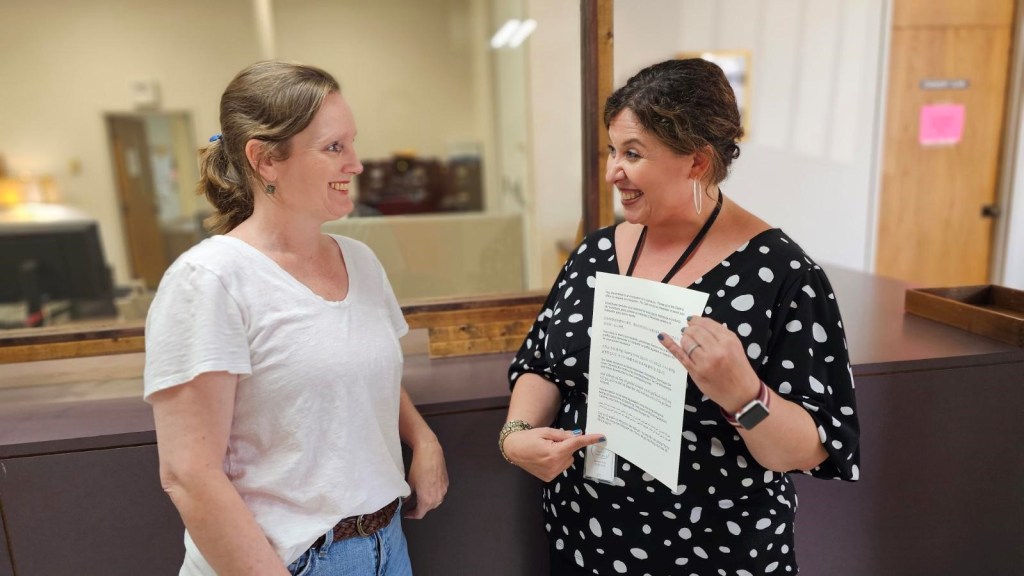Mississippi courthouses will soon have signs regarding rights to an interpreter
Published 4:16 pm Thursday, September 5, 2024

- PHOTO SUBMITTED Adams County Deputy Chancery Clerk Paige Dean, left, speaks with Language Access Director Deenie Miller on Aug. 9 in the Adams County Chancery Clerk’s Office in Natchez.
Signs are going up in courthouses around the state notifying limited English proficient people that they are entitled to have a free interpreter in court proceedings.
“Usted tiene derecho a un intérprete sin costo alguno. Acérquese a la oficina del Secretario para solicitar un intérprete. El Secretario llamará a un intérprete para que le ayude,” one of the signs reads in Spanish. In English, it says, “You are entitled to an interpreter at no cost to you. Please go to the Clerk’s office to request an interpreter. The Clerk will call an interpreter to assist you.”
The signs are written in Spanish, Vietnamese, Chinese, French, Arabic, Tagalog, German, Korean and Gujarti, the languages most frequently spoken besides English in Mississippi.
Trending
The first counties to receive the signs were Warren, Claiborne, Jefferson, Adams, Lee, Itawamba, Prentiss, Tishomingo, Alcorn and Tippah. All counties will receive the signs.
Signs are being posted in Circuit Courts, Chancery Courts, County Courts (if applicable), Youth Courts, Justice Courts and Municipal Courts.
Deenie Miller, Director of Language Access for the Administrative Office of Courts, has personally visited with court personnel to deliver the signs and explain statutory changes regarding the rights of people with limited English proficiency.
“It has been a great experience visiting each courthouse. The judges, clerks and court staff that I have had the opportunity to meet with have been very appreciative of the signs and the in-person visits,” Miller said. “I have been able to answer questions and offer guidance regarding some of the logistical issues that clerks face with finding and scheduling interpreters. I look forward to continuing my travels throughout Mississippi to visit each courthouse in the state.”
State laws which went into effect a little more than a year ago, on July 1, 2023, require qualified language interpreters for people with limited English proficiency in court proceedings in order to provide access to assistance at no charge for those who are limited in their understanding of English or who speak English as a second language. Court appointment of a qualified interpreter is required in criminal and civil cases, with the cost borne by the county or municipality. Requirements for access to a qualified interpreter include any instance arising out of or pertaining to the individual’s involvement in litigation, extending to litigants and witnesses in all phases of litigation, including hearings and depositions.
“The purpose of the new laws is to put LEP individuals on equal footing as those that are native English speakers,” said Miller. “This also pertains to assistance in the clerks’ offices.”
Trending
AOC and the Access to Justice Commission also have made progress in translating an array of civil forms and informational flyers that may assist those of limited financial means who seek to represent themselves without assistance of a lawyer. Forms have been translated in Spanish and Vietnamese, the two most frequently spoken languages behind English in Mississippi.
“Translating forms for LEP individuals is a goal the Commission has had for a long time and now seeing it come to fruition is a huge step toward expanding access to justice for the state,” said Nicole McLaughlin, Executive Director of the Access to Justice Commission. “We are so proud of our partnership with the Administrative Office of Courts and the Language Access Director, Deenie Miller. We are pleased to assist in providing these resources to our LEP Mississippians.”
Miller began collaboration with the Access to Justice Commission and the Mississippi Judicial College in 2022, starting with work to provide Spanish translations of 50 civil forms used in Justice Courts. The work expanded to Spanish and Vietnamese translations of some of the sample forms prepared by the Mississippi Judicial College for use in Justice Courts, Municipal Courts, Chancery Courts and Circuit Courts as well as educational and instructional information regarding court procedures.
Topics of translated forms and material include child custody, divorce, domestic abuse, guardianships and conservatorships, paternity, termination of parental rights, wills, bankruptcy and eviction, among others. Forms and educational materials explaining some of the procedures are posted on the website of the Mississippi Access to Justice Commission, https://www.msatjc.org/.
The Mississippi Center for Legal Services also will use translated material regarding its services, as well as information about bankruptcy, services for victims of crimes, and Social Security.
The Access to Justice Commission focuses only on civil legal access for low-income people. However, an appropriation from the Legislature allowed the Administrative Office of Courts to expand the translation project to include sample criminal forms for Justice Courts and Municipal Courts as well as documents for public defenders including an affidavit of indigence, a waiver of arraignment form and information explaining certain criminal court proceedings. Petitions to enter a guilty plea have been translated into Spanish and Vietnamese as well as Chinese and Arabic.




